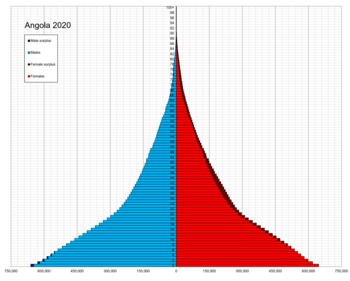
Back Demografía d'Angola AST Население на Ангола Bulgarian Demografia d'Angola Catalan Demografía de Angola Spanish Démographie de l'Angola French Demografía de Angola Galician 앙골라의 인구 Korean Angolos demografija Lithuanian Демографија на Ангола Macedonian Demografia de Angola Portuguese
| Demographics of Angola | |
|---|---|
 Population pyramid of Angola in 2020 | |
| Population | 34,795,287 |
| Birth rate | 41.8 births |
| Death rate | 8.01 deaths |
| Life expectancy | 62.11 years |
| Fertility rate | 5.83 |
| Net migration rate | -0.19 migrant(s) |
| Age structure | |
| 0–14 years | 47.83% |
| 65 and over | 2.3% |
| Nationality | |
| Nationality | Angolan |
Demographic features of the population of Angola include population density, ethnicity, education level, health of the populace, economic status, religious affiliations and other aspects.

According to 2014 census data, Angola had a population of 25,789,024 inhabitants in 2014.[1] Ethnically, there are three main groups, each speaking a Bantu language: the Ovimbundu who represent 37% of the population, the Ambundu with 25%, and the Bakongo 11%. Other numerically important groups include the closely interrelated Chokwe and Lunda, the Ganguela and Nyaneka-Khumbi (in both cases classification terms that stand for a variety of small groups), the Ovambo, the Herero, the Xindonga and scattered residual groups of San. In addition, mixed race (European and African) people amount to about 4%, with nearly 1% of the population being whites, mainly ethnically Portuguese.
As a former overseas territory of Portugal until 1975, Angola possesses a Portuguese population of over 200,000, a number that has been growing from 2000 onwards, because of Angola's growing demand for qualified human resources. Currently,[when?] over 300,000 Angolans are white, 1 million Angolans are mixed race (black and white) and 50,000 Angolans are from China, which accounts for 1.35 million people. In 1974, white Angolans made up a population of 350,000 people in an overall population of 6.3 million Angolans at that time. The only reliable source on these numbers is Gerald Bender & Stanley Yoder, Whites in Angola on the Eve of Independence: The Politics of Numbers, Africa Today, 21 (4) 1974, pp. 23 – 37. Today,[when?] many Angolans who are not ethnic Portuguese can claim Portuguese nationality under Portuguese law. Estimates on the overall population are given in O Pais.[2][3][4][5] Besides the Portuguese, significant numbers of people from other European and from diverse Latin American countries (especially Brazil) can be found. From the 2000s, many Chinese have settled and started up small businesses, while at least as many have come as workers for large enterprises (construction or other). Observers claim that the Chinese community in Angola might include as many as 300,000 persons at the end of 2010, but reliable statistics are not at this stage available.[6] In 1974/75, over 25,000 Cuban soldiers arrived in Angola to help the MPLA forces at the beginning of the Angolan Civil War. Once this was over, a massive development cooperation in the field of health and education brought in numerous civil personnel from Cuba. However, only a very small percentage of all these people has remained in Angola, either for personal reasons (intermarriage) or as professionals (e.g., medical doctors).
The largest religious denomination is Catholicism, to which adheres about half the population. Roughly 26% are followers of traditional forms of Protestantism (Congregationals, Methodists, Baptista, Lutherans, Reformed), but over the last decades there has in addition been a growth of Pentecostal communities and African Initiated Churches. In 2006, one out of 221 people were Jehovah's Witnesses. Africans from Mali, Nigeria and Senegal are mostly Sunnite Muslims, but do not make up more than 1 - 2% of the population. By now few Angolans retain African traditional religions following different ethnic faiths.
- ^ "Resultados Definitivos do Censo 2014 RESULTADOS DEFINITIVOS RECENSEAMENTO GERAL DA POPULAÇÃO HABITAÇÃO" (PDF). aiangola.com. 2014. Archived from the original (PDF) on May 6, 2016.
- ^ O País
- ^ "Flight from Angola". The Economist. August 16, 1975. ISSN 0013-0613. Retrieved July 10, 2017.
- ^ "Angola - The Portuguese Coup d'Etat and the End of the Colonial Era". countrystudies.us. Retrieved July 10, 2017.
- ^ (in Portuguese) Portugueses em Angola quadruplicaram Archived March 11, 2009, at the Wayback Machine, Jornal de Notícias (March 10, 2009)
- ^ "BBC News - Chinese karaoke fans sing Angola's praises". news.bbc.co.uk. October 2, 2010. Retrieved July 18, 2017.